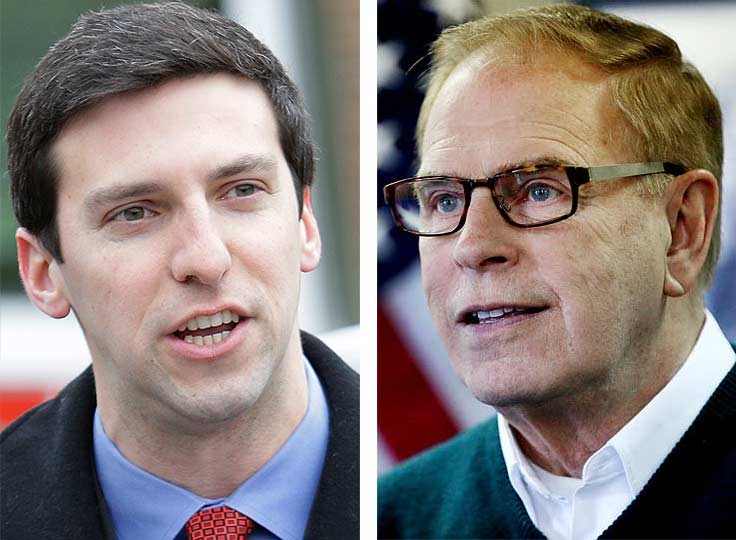
This is why political-party leaders hate primaries.
A dispute over who should speak at the Ohio Democratic Party’s state dinner on Saturday night — only endorsed U.S. Senate candidate Ted Strickland, or both he and challenger P.G. Sittenfeld — put the focus on the internal skirmish instead of both men’s messages against GOP incumbent Rob Portman.
When Sittenfeld was refused a speaking slot at the Columbus event, the Cincinnati councilman boycotted the dinner and drove to Cleveland to roll out an urban policy plan instead.
“In light of recent events in Ferguson, Baltimore, Cleveland and Charleston, it was more important to speak out about the critical issues affecting our cities than to eat, drink, mix and mingle at a party event where he would be muzzled and the stage reserved for favored political voices,” Sittenfeld’s campaign said.
Ohio Democratic Chairman David Pepper said it’s standard practice across the country for a party to give only its endorsed candidates an official speaking position.
“We have a very tight agenda,” Pepper told The Dispatch. “We invited our other candidate to come and shake every hand he could.”
About 1,000 tickets were sold for the gathering at the Greater Columbus Convention Center, in the same room for which Ohio Republicans sold 700 tickets exactly a week earlier.
Pepper said that Sittenfeld, a member of the party’s executive committee, also could have addressed those party leaders before the dinner, as Strickland did.
Ironically, Strickland called for party unity during his brief remarks before the executive committee.
Hearkening back to the successful 2011 campaign to repeal Senate Bill 5, which gutted public employee collective-bargaining rights, the former governor said, “We all came together, and we showed them what we can do when we have solidarity. And that’s what we need in 2016.”
Later, Strickland said “if the endorsement means anything” it should entitle him to the sole speaking spot.
Sittenfeld not only laid out his urban policy in the Cleveland speech but laid into Strickland.
He questioned where the former governor stands on gun control after the latest killings at a Charleston church’s Bible study and of Cincinnati police officer Sonny Kim.
“I hope he will come out from behind his ‘A’ rating from the NRA long enough to tell us,” Sittenfeld said.
Strickland said Americans “need to search our souls” to determine why people act in such violent ways, from the shootings to road rage to school bullying. He said he hopes the National Rifle Association would be part of that national conversation.
Sittenfeld also promoted a federal guarantee that all full-time workers would get a minimum number of sick days. Sittenfeld noted that Strickland opposed such a proposal as governor in 2008, when Ohio was falling into the Great Recession.
“Gov. Strickland sided with the Ohio Chamber of Commerce,” Sittenfeld said. “He called the proposal ‘unworkable’ and ‘detrimental to Ohio’s economy.’ And he effectively killed that proposal when he said he opposed it and would actively work against it.”
Strickland said he tried to strike a deal between business interests and worker advocates who circulated a petition to put a measure on the Ohio ballot, but was unsuccessful. He said he had nothing to do with the group’s decision not to go ahead with the ballot proposal, and that he backs a federal requirement.
Strickland focused on Portman during his speech, saying he is part of a Senate “where millionaires go to look after the interests of billionaires.”
The GOP first-termer has contributed to a “middle-class squeeze” by supporting trade deals and “ massive tax breaks for Wall Street banks and multinational corporations who aren’t paying their fair share,” Strickland said.
Among the elements of Sittenfeld’s urban policy: increasing the minimum wage to $10.10 right away and to $15 in a few years; borrowing the billions needed to fix the country’s aging infrastructure and putting urban dwellers to work on needed improvements; decriminalizing marijuana possession; and requiring universal background checks while ending the so-called gun-show loophole.
- Publish my comments...
- 0 Comments
